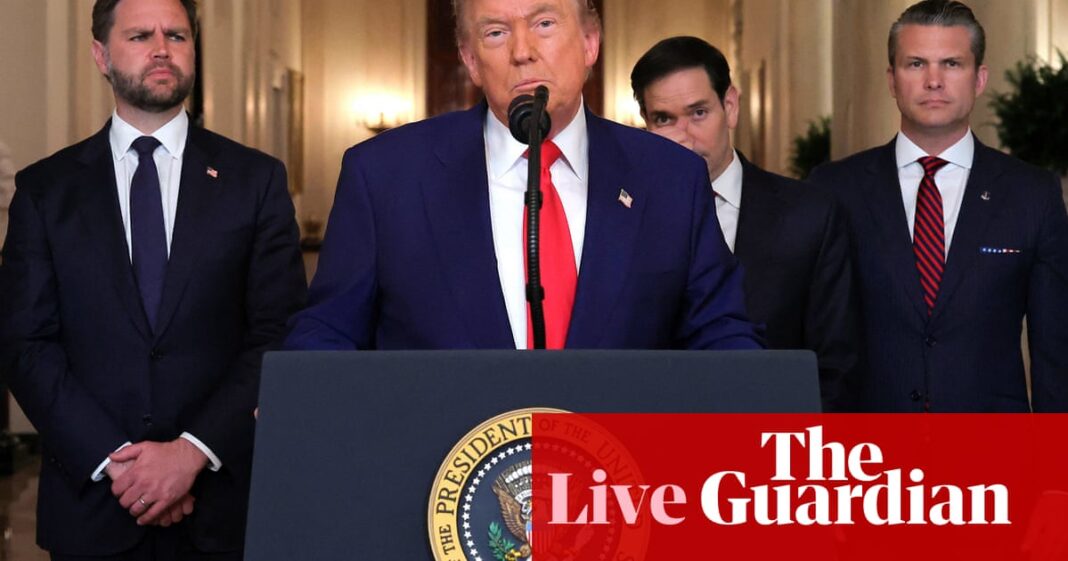Summary so far
If you are just joining us, there have been major developments over the last few hours, with the US launching a surprise bombing attack on three Iranian nuclear facilities. The action was praised by Israel, and condemned by Iran and its allies. Iran soon launched missiles at Israel, who then fired back with their own air raids on Iranian targets.
You can catch up on the key details below.
-
Donald Trump announced on Saturday the US had successfully completed strikes on three nuclear sites in Iran, and claimed that key enrichment facilities there had been “totally and completely obliterated”. The sites struck were Fordow, Natanz, and Esfahan.
-
Iranian officials downplayed the claim, saying there was no danger to the residents living near the nuclear facilities hit by US strikes, according to Iranian state media. Quoting the Crisis Management Headquarters in the province of Qom, where the Fordow facility is located, the IRNA news service said “there is no danger to the people of Qom and the surrounding area”. Al Jazeera reported earlier that another official said Fordow has “long been evacuated and has not suffered any irreversible damage”.
-
The International Atomic Energy Agency says there is currently no increase in off-site radiation levels at the three nuclear sites hit by US strikes. Saudi Arabia’s Nuclear and Radiological Regulatory Authority has said no radioactive effects have been detected in Gulf states.
-
Trump said Iran must now make peace, adding: “If they do not, future attacks will be far greater and a lot easier. For 40 years, Iran has been saying death to America, death to Israel.” He said there were “many targets left” in the country for the US to hit. He later warned that any retaliation by Tehran against the US would be met with “force far greater than what was witnessed tonight”.
-
He praised Israeli prime minister Benjamin Netanyahu, saying they “worked as a team like perhaps no team has ever worked before”, and gone a long way towards “erasing this horrible threat to Israel”.
-
Iran’s foreign minister, Seyed Abbas Araghchi, said Iran “reserved all options to defend its sovereignty, interest, and people” against the “outrageous” attack which he said would have “everlasting consequences”.
-
A Yemeni Houthi official said a response by the group to the US strikes on Iran were “only a matter of time” and that the ceasefire agreement made with the US was before Trump decided to bomb the Iranian nuclear facilities.
-
Hours after the attack on its nuclear facilities, Iran launched waves of missiles at Israel. Sirens were reported in north and central Israel, reportedly hitting some sites including in Tel Aviv and Haifa, and injuring at least 10 people according to Israeli rescue services.
-
Netanyahu praised the US attack, saying that the “awesome and righteous might of the United States will change history”. The Israeli prime minister said in a video address, the US “has done what no other country on Earth could do”.
-
United Nations Secretary-General António Guterres on Saturday branded the US strikes on Iran as a “dangerous escalation in a region already on the edge – and a direct threat to international peace and security.” He added: “There is a growing risk that this conflict could rapidly get out of control – with catastrophic consequences for civilians, the region, and the world.”
-
British prime minister Keir Starmer has urged Iran to return to the negotiating table and said that stability in the region remained a priority.
-
The Iranian Atomic Energy Organisation called the US attack “a barbaric act that violated international law, especially the nuclear non-proliferation treaty”.
-
The decision to directly involve the US comes after more than a week of strikes by Israel on Iran that have moved to systematically eradicate the country’s air defences and offensive missile capabilities, while damaging its nuclear enrichment facilities. Iran has retaliated with strikes against Israel.Israel launched the attacks on Iran saying that it wanted to remove any chance of Tehran developing nuclear weapons. Iran has argued that its nuclear program is intended for peaceful purposes.
-
Iran’s President Masoud Pezeshkian had warned earlier on Saturday of a “more devastating” retaliation should Israel’s nine-day bombing campaign continue, saying the Islamic republic would not halt its nuclear program “under any circumstances.”
-
Iran’s supreme leader Ayatollah Ali Khamenei warned on Wednesday that US strikes targeting the Islamic Republic will “result in irreparable damage for them”.
-
The attack has divided opinions among US lawmakers. Most – but not all – Republicans have supported Trump’s action, while most – but again, not all – Democrats have condemned it. Some Democrats have called for the War Powers act to be enforced against Trump and his “unconstitutional” act taken unilaterally without Congress approval.
Key events
UK did not take part in US strikes on Iran, minister confirms
UK business secretary Jonathan Reynolds has said the British government was aware of the US’ plans to launch airstrikes on Iran, but did not take part.
Speaking to the broadcaster Sky News on Sunday morning, he said the UK did not get a request by the US to use its Diego Garcia base in the Indian Ocean.
Reynolds said: “We support the prevention of Iran obtaining a nuclear weapon. We had proposed a diplomatic course of action, as other European countries had done, the Iraians had rejected that.
“I know people will be waking up this morning, and they’ll be worried. They’ll want to know what this means, and I do want to give them reassurance that whilst the British government, the UK has not been involved in these attacks, we have been making extensive preparations for all eventualities, including how we look after British nationals in the region and how we get them out, and the assets we have in the region to protect British infrastructure, British bases, British personnel, if we need to do that.”
He added: “I can’t tell you exactly when we did know but we were informed, as you might expect, by a key ally, of this action.”
More reaction is coming in from the Middle East to the US’ strikes on Iran overnight.
Saudi Arabia has expressed its “great concern” according to a statement posted on X. Its foreign ministry posted on X that it wanted a “political solution to end the crisis”, Reuters reported.
Meanwhile Oman said the US targeting of Iran threatened to “widen the war”, and is a violation of international law, according to state media. Oman had been mediating nuclear talks between Washington and Tehran.
Qatar said it “deplores deterioration” and “dangerous tensions” after the US bombing would lead to “catastrophic repercussions” on regional and international levels, its foreign ministry posted on X.
The head of Iran’s atomic energy organisation, Mohammad Eslami, has written to the International Atomic Energy Agency asking for an investigation into the US attacks on Iran.
Eslami said the “illegal action” should be examined and said the IAEA’s head Rafael Grossi should stop his “inaction”, condemn US strikes, and take “appropriate” measures.
Reuters reports Eslami has also told Grossi that Iran had taken necessary measures to defend its “sovereign rights” and “will pursue appropriate legal measures”.
Israel said it has attacked two Iranian fighter jets overnight, as part of a range of operations against Iranian military sites.
In a post by the Israeli Defence Force (IDF) on X, it said dozens of locations were targeted in central Iran.
The two F5 Iranian fighter jets were hit at the Dezful airport.
The IDF added eight launchers were destroyed in operations, as well as a military site containing “components for the production of explosives”.
It added the air force: “Attacked military infrastructure at the airport in Isfahan, in order to prevent the Iranian air force from using military infrastructure at the site”.
Julian Borger
Ness Ziona, a town to the south-east of Tel Aviv was hit by an Iranian missile at about 8am this morning.
The missile destroyed or damaged about a dozen two-storey homes in a residential area, but there were no serious injuries.
Adam Hezy of the fire department from the neighbouring town of Rehovot, said he and his colleagues had rescued 20 people who had survived the blast inside their reinforced secure rooms, which are compulsory in modern Israeli homes.
Clayton Rucaly, a Brazilian who had arrived in the neighbourhood just seven months ago, was in a nearby shelter when the missile fell. “This one was so close, we were all scared it had hit our homes,” he said.
Asked what he thought about the US intervention in the war, Rudely said it was hard not to be ambivalent after the missile strike.
“In part, I feel like it’s necessary,” Rucaly said. “It seems like it’s going to be good for Israel, because the war can end now perhaps, especially with the help of the US,” he said, but added there is apprehension over the possible Iranian response.
“There is a kind of double fear: about what can happen to us now.”
EU’s Kallas calls for negotiations
EU foreign ministers will meet on Monday to discuss the US strikes on Iran.
The EU’s foreign affairs chief, Kaja Kallas posted on X that Iran must not be allowed to develop a nuclear bomb, and urged calm.
Kallas, who is also a vice-president of the European Commission said: “Iran must not be allowed to develop a nuclear weapon, as it would be a threat to international security.
“I urge all sides to step back, return to the negotiating table and prevent further escalation.
“EU foreign ministers will discuss the situation tomorrow.”
Highly enriched uranium ‘moved from Fordow’, Iranian sources claim
Senior Iranian sources have told Reuters most of the highly enriched uranium at the Fordow site had been moved away before the US attack.
The news agency reported comments that the number of staff at the underground facility at Fordow had also been reduced to a minimum.
Fordow was the second enrichment site to be hit by the US, along with Natanz.
The International Atomic Energy Agency (IAEA) will meet on Monday after the United States’ bombing of Iranian nuclear sites.
In a post on X, formerly known as Twitter, its head Rafael Grossi said: “In light of the urgent situation in Iran, I am convening an emergency meeting of the IAEA board of governors for tomorrow.”
The IAEA said earlier it had detected no increase of radiation at the sites which had been bombed by the US. (see 6.14am)
Iran has asked the UN security council to condemn the US airstrikes on its nuclear sites.
In a letter to UN secretary general António Guterres and the body’s president, Carolyn Rodrigues-Birkett, Iran’s ambassador to the UN Amir Saeid Iravani called for an urgent meeting of the security council.
He said: “The United States, acting in full coordination with the Israeli regime, which at the time was already bombarding Iranian civilians and vital infrastructure, carried out deliberate, premeditated and unprovoked aerial strikes against three safeguarded Iranian nuclear sites and facilities.”
Iravani added: “In light of the grave and far-reaching consequences of the United States’ savage and criminal actions for international peace and security, the Islamic Republic of Iran urgently requests the security council to convene an emergency meeting without delay to address this blatant and unlawful act of aggression, to condemn it in the strongest possible terms, and to take all necessary measures under its charter-mandated responsibilities that the perpetrator of such heinous crimes is held fully accountable and does not go unpunished.”
Summary so far
If you are just joining us, there have been major developments over the last few hours, with the US launching a surprise bombing attack on three Iranian nuclear facilities. The action was praised by Israel, and condemned by Iran and its allies. Iran soon launched missiles at Israel, who then fired back with their own air raids on Iranian targets.
You can catch up on the key details below.
-
Donald Trump announced on Saturday the US had successfully completed strikes on three nuclear sites in Iran, and claimed that key enrichment facilities there had been “totally and completely obliterated”. The sites struck were Fordow, Natanz, and Esfahan.
-
Iranian officials downplayed the claim, saying there was no danger to the residents living near the nuclear facilities hit by US strikes, according to Iranian state media. Quoting the Crisis Management Headquarters in the province of Qom, where the Fordow facility is located, the IRNA news service said “there is no danger to the people of Qom and the surrounding area”. Al Jazeera reported earlier that another official said Fordow has “long been evacuated and has not suffered any irreversible damage”.
-
The International Atomic Energy Agency says there is currently no increase in off-site radiation levels at the three nuclear sites hit by US strikes. Saudi Arabia’s Nuclear and Radiological Regulatory Authority has said no radioactive effects have been detected in Gulf states.
-
Trump said Iran must now make peace, adding: “If they do not, future attacks will be far greater and a lot easier. For 40 years, Iran has been saying death to America, death to Israel.” He said there were “many targets left” in the country for the US to hit. He later warned that any retaliation by Tehran against the US would be met with “force far greater than what was witnessed tonight”.
-
He praised Israeli prime minister Benjamin Netanyahu, saying they “worked as a team like perhaps no team has ever worked before”, and gone a long way towards “erasing this horrible threat to Israel”.
-
Iran’s foreign minister, Seyed Abbas Araghchi, said Iran “reserved all options to defend its sovereignty, interest, and people” against the “outrageous” attack which he said would have “everlasting consequences”.
-
A Yemeni Houthi official said a response by the group to the US strikes on Iran were “only a matter of time” and that the ceasefire agreement made with the US was before Trump decided to bomb the Iranian nuclear facilities.
-
Hours after the attack on its nuclear facilities, Iran launched waves of missiles at Israel. Sirens were reported in north and central Israel, reportedly hitting some sites including in Tel Aviv and Haifa, and injuring at least 10 people according to Israeli rescue services.
-
Netanyahu praised the US attack, saying that the “awesome and righteous might of the United States will change history”. The Israeli prime minister said in a video address, the US “has done what no other country on Earth could do”.
-
United Nations Secretary-General António Guterres on Saturday branded the US strikes on Iran as a “dangerous escalation in a region already on the edge – and a direct threat to international peace and security.” He added: “There is a growing risk that this conflict could rapidly get out of control – with catastrophic consequences for civilians, the region, and the world.”
-
British prime minister Keir Starmer has urged Iran to return to the negotiating table and said that stability in the region remained a priority.
-
The Iranian Atomic Energy Organisation called the US attack “a barbaric act that violated international law, especially the nuclear non-proliferation treaty”.
-
The decision to directly involve the US comes after more than a week of strikes by Israel on Iran that have moved to systematically eradicate the country’s air defences and offensive missile capabilities, while damaging its nuclear enrichment facilities. Iran has retaliated with strikes against Israel.Israel launched the attacks on Iran saying that it wanted to remove any chance of Tehran developing nuclear weapons. Iran has argued that its nuclear program is intended for peaceful purposes.
-
Iran’s President Masoud Pezeshkian had warned earlier on Saturday of a “more devastating” retaliation should Israel’s nine-day bombing campaign continue, saying the Islamic republic would not halt its nuclear program “under any circumstances.”
-
Iran’s supreme leader Ayatollah Ali Khamenei warned on Wednesday that US strikes targeting the Islamic Republic will “result in irreparable damage for them”.
-
The attack has divided opinions among US lawmakers. Most – but not all – Republicans have supported Trump’s action, while most – but again, not all – Democrats have condemned it. Some Democrats have called for the War Powers act to be enforced against Trump and his “unconstitutional” act taken unilaterally without Congress approval.

Dan Jervis-Bardy
The Australian government has called for “de-escalation, dialogue and diplomacy” after the US bombed Iran, as almost 4,000 Australian citizens attempt to escape the conflict zone.
A statement issued after Trump’s White House address, which was not attributed to any specific Australian minister or spokesperson, did not explicitly endorse the strikes, but reiterated Australia’s position on the risk posed by Iran’s nuclear program.
“We have been clear that Iran’s nuclear and ballistic missile program has been a threat to international peace and security,” the government spokesperson said.
“We note the US president’s statement that now is the time for peace. The security situation in the region is highly volatile. We continue to call for de-escalation, dialogue and diplomacy.”
Read more here:
Starmer urges Iran to negotiate
British Prime Minister Keir Starmer has urged Iran to return to the negotiating table and said that stability in the region remained a priority.
In a statement Starmer suggested some support for the US actions, saying:
“Iran’s nuclear programme is a grave threat to international security. Iran can never be allowed to develop a nuclear weapon and the US has taken action to alleviate that threat. The situation in the Middle East remains volatile and stability in the region is a priority. We call on Iran to return to the negotiating table and reach a diplomatic solution to end this crisis.

Julian Borger
Analysis from the Guardian’s senior international correspondent:
Iran had sought to deter Donald Trump from joining Israel’s bombing campaign with dire threats of retaliation, but its options now are limited and fraught with risk.
Iranian officials have said specifically that US ships and military bases would be targeted, but much of the capacity it had relied on as a deterrent has been stripped away over the past few days by Israeli strikes. Those strikes however, have focused on long-range ballistic missile launchers. Iran still has a formidable arsenal of shorter-range missiles and drones.
The US has taken precautions over the past few weeks, dispersing its naval presence in the region and beefing up air defences, to try to ensure it presents as hard a target as possible.
Furthermore, Trump warned on Sunday of broader US involvement in Israel’s war if Iran attempts to strike back, and in recent days suggested that one of the targets for US bombers would be the supreme leader, Ayatollah Ali Khamenei.
Iran’s other principal weapon, built up over decades, is its network of alliances with regional militias, its “axis of resistance” but that too has been depleted. Hezbollah’s extensive missile arsenal was pulverised by the Israeli air force last year. Israeli planes have returned to keep the Lebanese Shia force in check, bombing an alleged missile stockpile in south Beirut in April.
A Tehran-backed Shia militia in Iraq, Kata’ib Hezbollah, has threatened to target “US interests” in the Middle East in response to Washington’s participation in Israel’s support. One of its commanders, Abu Ali al-Askari, was quoted on CNN as saying that US bases in the region “will become akin to duck-hunting grounds”.
The United States has military facilities across at least nineteen sites across the Middle East, some eight of them permanent.
Another Iranian partner, the Houthi forces in Yemen, agreed a ceasefire with the US in May but they have warned they would regard the truce to be broken if Trump decided to take part in attacks on Iran, and would target US ships in the Red Sea, something the Houthis have done with mixed results in the past.
The entry of any of these militias into the war would draw a devastating response from the US, which has been preparing for just such a contingency over the months that Israel has been preparing its attack.
Israel launches counter strikes on Iran
Israel’s military says it has launched a wave of attacks on western Iran, shortly after Iran hit several Israeli cities with missiles.
A spokesman said on social media:
The Air Force has begun a wave of raids on Iranian military targets in western Iran. This morning, the Air Force also struck missile launchers which were ready to launch toward Israel, along with Iranian military personnel. Missile launchers used to launch missiles toward Israeli territory were also targeted.”
Iranian missiles hit 10 Israeli locations – report
Israeli emergency services have said about 10 sites were hit by Iran’s missiles, including in Tel Aviv, Carmel, and Haifa – which reportedly did not hear any alert sirens.
About 14 people are believed to have been injured, most not seriously. Rescuers are continuing to search the impact sites. Some buildings in Tel Aviv have been destroyed, Haaretz reports.
No radiation increase detected at struck nuclear sites
The International Atomic Energy Agency says there is currently no increase in off-site radiation levels at the three nuclear sites hit by US strikes.
“IAEA will provide further assessments on situation in Iran as more information becomes available,” it said.
Israeli media is reporting several Iranian missiles breached air defences to hit parts of the country. The locations and number of strikes are not clear, and Israeli authorities also instruct people not to publish or share information or recordings of direct hits.
Citing rescue services, the Haaretz media outlet there are some initial claims of casualties in central Israel, as well as strikes in Haifa where missile alerts reportedly did not go off.
Meanwhile the Israeli Defence Force says it has detected a second barrage of missiles from Iran. Iranian state TV is claiming 30 missiles have been fired at Israel today.





